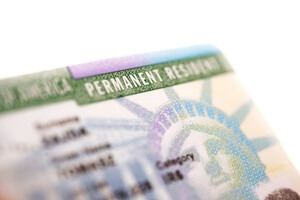TL;DR:
Removing conditions from your Green Card requires proving the legitimacy of your marriage and navigating strict USCIS scrutiny. A lawyer can help you gather persuasive evidence, meet deadlines, and respond to any Request for Evidence or interview notice. Failing to do so can result in loss of status and possible deportation. Legal guidance ensures you’re not navigating this alone.
Every couple who navigates the U.S. marriage-based immigration system must eventually face the removal of conditions stage. It’s a crucial process that can decide whether your Green Card becomes permanent or not.
Filing Form I-751 and securing lawful permanent residency can be complex, especially without proper preparation. Let’s explore why legal guidance plays a key role in safeguarding your future during this critical step.
Conditional Residency Explained
Conditional residency applies to Green Cards issued through marriage when the marriage is less than two years old at the time of approval. This conditional status requires action before the card expires.
Recognizing the short-term nature of conditional residency is critical. Let’s break down what this means for you and why filing to remove those conditions is a non-negotiable next step.
What Is Conditional Residency?
Conditional residency is a two-year status granted to immigrants whose Green Card is based on a recent marriage. This condition aims to prevent fraudulent marriages entered solely for immigration benefits.
You must take action to convert this temporary status to permanent residence. Failing to do so on time can result in automatic loss of your immigration status and even removal proceedings.
When Do You File To Remove Conditions?
You must file Form I-751 during the 90 days before your conditional Green Card expires. Filing outside of this window—either early or late—can lead to denial.
Timeliness is not optional; it is essential. Filing within the proper time frame ensures continued legal status and work authorization while your petition is under review.
Who Can File Jointly?
If you are still married and living with your spouse, you file a joint petition. You’ll both sign the form and submit documents that prove your marriage is genuine and ongoing.
Joint filing is the standard route and typically the least complicated. Let’s now turn to what can go wrong—and why legal support can prevent those problems.
The Legal Risks Of Getting It Wrong
Failing to properly file Form I-751 or provide sufficient evidence can have serious consequences. Many people overlook these risks until they’re facing a denial or notice to appear in court.
The removal of conditions is not just another immigration form. It is a decisive stage where mistakes can result in the loss of lawful status and future immigration benefits.
At a minimum, failing to file or doing so improperly may result in:
- Automatic loss of permanent resident status.
- Initiation of removal (deportation) proceedings.
- Loss of work and travel authorization.
- Barriers to applying for naturalization later.
When stakes are this high, having the right legal representation gives you more than peace of mind. It positions your case for success from the beginning.
A Lawyer Can Help Strengthen Your Case
Legal support transforms what might feel like a confusing process into a clear, manageable pathway. Your lawyer knows how USCIS thinks and how to present your relationship effectively.
Here’s what a lawyer can do that self-filers often overlook—and why it matters so much to your case outcome.
Filing Within The Required Timeframe
Your attorney will calculate and track the exact 90-day window before your card expires. Missing this window—even unintentionally—can result in rejection or severe processing delays.
This precision helps preserve your status without interruption. As we move forward, let’s look at the importance of gathering strong supporting documents.
Compiling Strong Documentary Evidence
Your lawyer will guide you on what types of documentation USCIS wants to see. It includes everything from joint tax returns to shared utility bills and travel records.
These materials need to be recent, consistent, and convincingly presented. Once you’ve compiled them, the next hurdle is navigating any potential complications in your relationship history.
Navigating Complex Marital Or Legal Situations
Legal help becomes especially important if you’re separated, divorced, or have experienced abuse. A lawyer can determine whether you qualify for a waiver and how best to present that request.
Cases involving non-cooperative spouses, abuse, or hardship demand both sensitivity and precision. Next, let’s explore these waiver categories more closely and when they apply.
Waiver-Based Filings: Key Legal Pathways
If your marriage has ended or other complications prevent joint filing, you may still qualify under one of several waiver categories. Each waiver has its own set of legal requirements.
Knowing which waiver applies and how to prove it is essential. With legal help, you can choose the strongest path and compile the correct supporting evidence.
| Waiver Type | Situation | Legal Standard |
| Divorce Waiver | Marriage ended in divorce or annulment. | Must show marriage was in good faith. |
| Abuse Waiver | You were abused or subjected to extreme cruelty. | Must show evidence of abuse (police reports, medical records, affidavits). |
| Extreme Hardship Waiver | Removal would cause extreme hardship. | Must prove hardship occurred during the conditional period and would worsen if removed. |
Choosing the correct waiver and building a solid case often requires experienced legal interpretation. Next, let’s look at how USCIS reviews I-751 cases.
USCIS Review: What To Expect
Once you file Form I-751, USCIS evaluates whether your marriage was authentic and if you meet legal requirements. This process includes reviewing your documents and potentially calling you for an interview.
An attorney can help you prepare for interviews and respond to additional requests from USCIS. Legal insight at this stage can prevent delays and denials.
Here’s how the USCIS review process unfolds:
- Background checks to verify your identity and any immigration or criminal issues.
- Document review to assess the legitimacy of your marriage and your legal status.
- Interviews are increasingly common, especially if red flags or inconsistencies arise.
Legal support ensures you’re prepared, from anticipating red flags to crafting responses to RFEs or NOIDs. Let’s now explore what can go wrong when you try to do this alone.
What Happens When You File Alone
Many people attempt to file Form I-751 without legal help, only to be surprised by unexpected obstacles. Even simple errors can create delays or lead to denied petitions.
The cost of filing alone can be far greater than the price of legal support. Legal missteps can cause years of complications or place your status at risk entirely.
Common pitfalls include:
- Missing deadlines or incomplete forms.
- Submitting insufficient or conflicting evidence.
- Unpreparedness for interviews or RFEs.
- Choosing the wrong waiver or filing category.
Avoiding these risks is why working with an immigration attorney is a smart investment. Let’s examine the frequently asked questions about the removal of conditions.
Frequently Asked Questions (FAQs)
Many applicants feel anxious about the removal of conditions process. These frequently asked questions reflect what we hear from clients and provide clarity to help you stay proactive and fully informed throughout.
Empty heading
What If My Spouse & I Are Separated But Not Divorced?
You may file jointly if reconciliation is ongoing. Provide strong evidence of a shared life. Legal advice is crucial for showing the marriage remains valid despite temporary physical separation.
Can I Still Work & Travel While My Petition Is Pending?
Yes, your USCIS receipt notice automatically extends your status for 48 months. Carry it with your expired Green Card to confirm eligibility for work and international travel.
What Happens If I Get Divorced Before Filing?
You must file a waiver instead of a joint petition. Submit evidence that your marriage was genuine at the start. Divorce alone doesn’t disqualify you if documents support good faith.
What If I Miss The 90-Day Filing Window?
USCIS may accept late filings if you prove extraordinary circumstances. Explain the delay clearly and support your claim with documentation. An attorney can help present this effectively.
Do I Still Need An Interview If I Submit Strong Evidence?
Maybe. USCIS may waive the interview if your documents are detailed and consistent. Still, some applicants underwent the interview regardless. Preparation ensures you’re ready if one is scheduled.
Let’s shift from what can go wrong to how to stay on track.
Practical Reminders To Stay On Track

These habits, while small, help prevent delays and signal to USCIS that you take the process seriously. They also make your attorney’s job easier in advocating for your case.
- Read every USCIS notice thoroughly. Even simple typos or missed appointments can lead to rejection or denial.
- Keep all shared financial and housing records. These become critical pieces of evidence later.
- Check the Visa Bulletin monthly. It helps track category availability and long-term planning.
- Make digital and paper copies of everything. Always back up your documents.
- Keep your address current with USCIS. Use Form AR-11 within 10 days of moving.
- Consistency and preparation lead to smoother outcomes. Let’s now close by reflecting on the bigger picture—your journey to permanent residency.
Protect Your Path To Permanent Residency
Removing conditions is not just another step in your immigration process—it’s a critical milestone. It decides whether your temporary Green Card becomes permanent or whether your status is at risk.
You don’t have to navigate this alone, and you shouldn’t. Lozano Law Firm in San Antonio, Texas, can clarify your pathway toward permanent residency. With legal guidance, your case is stronger, your evidence is clearer, and your path forward becomes more secure.

 Thank you for contacting us. Please complete this form and one of our team members will be in touch with you soon.
Thank you for contacting us. Please complete this form and one of our team members will be in touch with you soon.